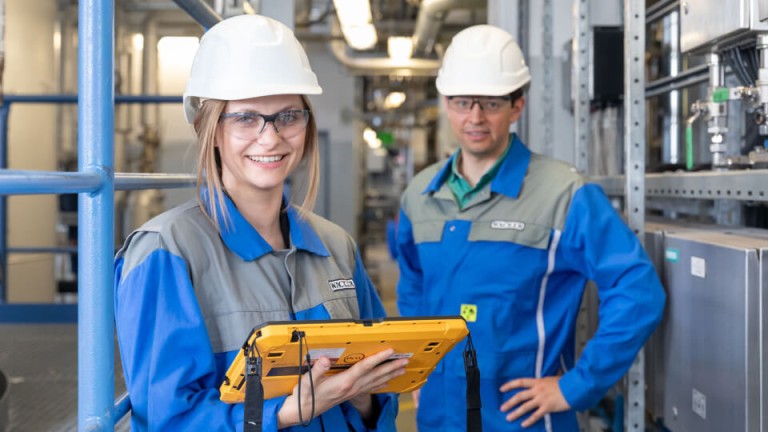Our system has noticed that you are based in , but the current country setting is . Select country

Interview - Moving Forward
DooJin Kang, technical manager at Wacker Chemicals Korea, talks about the opportunities, the challenges and the future of e-mobility on the Korean market
After receiving a master’s degree in organo-silicone chemistry, DooJin Kang worked for several different companies before he joined Wacker Chemicals Korea in 2006. Today, he is a technical manager and leads one of the teams specializing in the application development of silicones for automotive electronics.
In the past 15 years, WACKER Korea made its way to the top of the market

When I joined Wacker Chemicals Korea in 2006, it only had 12 employees and was not widely known in the local market. I saw it as an opportunity to take part in the expansion and success of the company. Today, WCK has around 200 employees and is the market leader for on-board charger applications in Korea. It was and is a group effort to reach and hold this position. My team developed the product, but we also need to think about the other colleagues, like the production workers, sales managers and distributors.
Korea is an attractive location for global companies such as WACKER
Korea is known as a good test market where you can get market feedback very quickly. Being geographically close to customers is a great advantage for new product development. The test results of the samples can be delivered from the customer almost in real time and thus, the information can be immediately applied to improve the product development. Working with customers in the same time zone, region and business culture, including the same language, is a huge advantage.
An open atmosphere promotes new ideas

My team and I are mainly responsible for automotive electronics. We handle all technical tasks, from customer technical service to production support, as well as the development of new products. In order to handle this wide variety of tasks, we have to collaborate as a team. This is why I promote an open atmosphere at work: You have to be able to share your ideas freely and openly but also leave room for mistakes. I think this is one of the things that the German company culture and the Korean company culture have in common: We place great importance on the relationship among people.
New products for the e-mobility sector
We work on thermal conductive material for on-board chargers. On-board chargers (OBC) are the power chargers for electric cars. Unlike mobile phones, the charger is not external but installed into the vehicle itself. But like the charger of a mobile phone, the OBC also gives off heat when in use. This is where WACKER’s thermal conductive silicones come into play.
Competition promotes innovation
The biggest challenge is definitely the thermal conductivity. During high-speed charging time, the temperature of the transformer and the inductor is increased over 180 °C. But if the temperature is over 180 °C, the on-board charger will be damaged and stops working. So, the function of thermal conductive silicones is transferring this heat away from the charger.
The right level of viscosity is also tricky. The silicone that fills the complicated structure of the on-board charger has to be liquid enough so that no air bubbles develop. Air acts like an insulator and would raise the temperature even quicker. But we want the opposite effect. So, the combination of the best thermal conductivity, right level of viscosity and then, of course, competitive pricing is the most difficult thing to get right.
"ELASTOSIL® RT 739 TC and ELASTOSIL® RT 733 TC are the most optimized products on the market of thermal conductive silicones at this point. That’s why customers choose WACKER."
DooJin Kang
E-mobility will eventually reach the mainstream
The e-mobility market is growing fast and is highly competitive. This also means that companies invest heavily in research. To extend the car’s reach with a single charge, the parts have to be smaller and lighter. This does not only apply to the on-board charger but everything that generates heat, such as autonomous driving related parts. In general, the product cycle might follow that of LCD displays. When they first arrived on the market, they were very expensive and an exclusive item. Today, they are more common and affordable. Maybe, in ten years’ time, everybody will have the opportunity to own an electric vehicle.

State-of-the-art laboratories for the research of e-mobility
At the Center of Excellence Electronics (COEE), located in the Pangyo Techno Valley, experts are working on silicones for the high-tech applications of the future. E-mobility is only one of the fields of research. And because we want to share our know-how, we have the WACKER ACADEMY. I hold about 15 seminars a year. As the electric vehicle market becomes more important, so do silicone products. As a result, it seems that the interest in our seminars is increasing.
I recently held a seminar on battery safety, but the participants were also interested in silicone products and asked many questions about the subject. Some weeks later, I had a chance to visit the customer’s pilot line test site. I was very proud to see that the questions we discussed during the seminar were applied in the pilot line. This goes to show that customers come to the WACKER ACADEMY to learn how to improve their work and make their product more successful.
WACKER has the right course for the next 100 years
When we anticipate the future of the electronics industry, I think that AI, robots and eco-friendly autonomous vehicles are the driving forces that will lead the future electronics industry. The basics of these all require electronic components such as batteries, high-speed processing, high-speed internet and high-performance sensors. Furthermore, these parts are essential to compact size and light weight, so controlling heat generation during the operation of these electronic parts will be a key technology. Therefore, thermally conductive silicones will remain important and probably become the core products of WACKER silicones for electronics.
With regard to the company as a whole, I think that the fundamental reason why WACKER has a history of more than 100 years is that it values the employees who make up the company and that’s why no one doubts WACKER’s next 100 years. I would like to be part of this success.
“My personal goal is to stay with WACKER until my retirement.”
Further Information
The goal of Silicones R&D Center and extended Polymers Technical Center, with its research and testing laboratories, is to optimize technical support for customers.
WACKER ACADEMY in Pangyo will cater to your specific needs with emphasis on electronics, automotive, consumer care, adhesives and sealants as well as construction industries issues.
The president of Wacker Chemicals Korea talks about the value of R&D, why safety takes priority and staying agile to meet future challenges.












